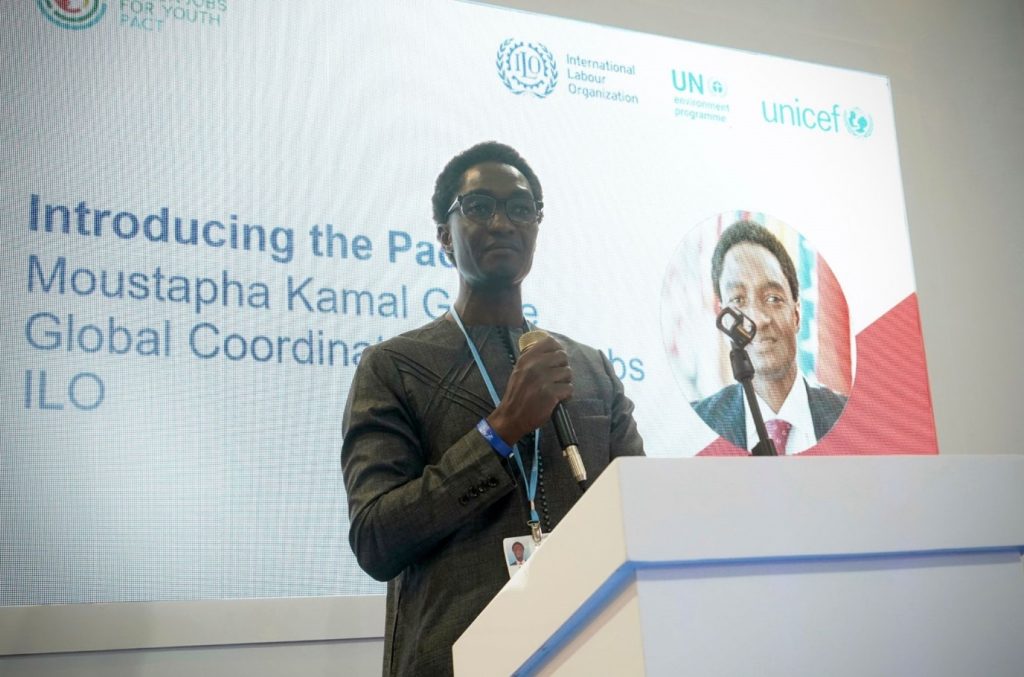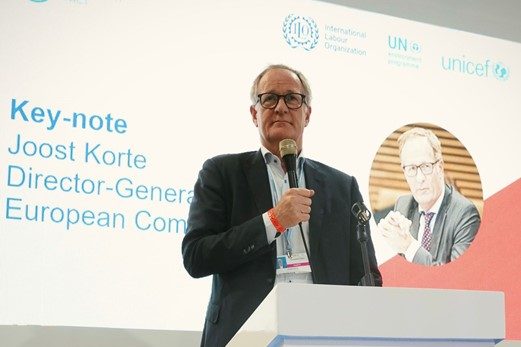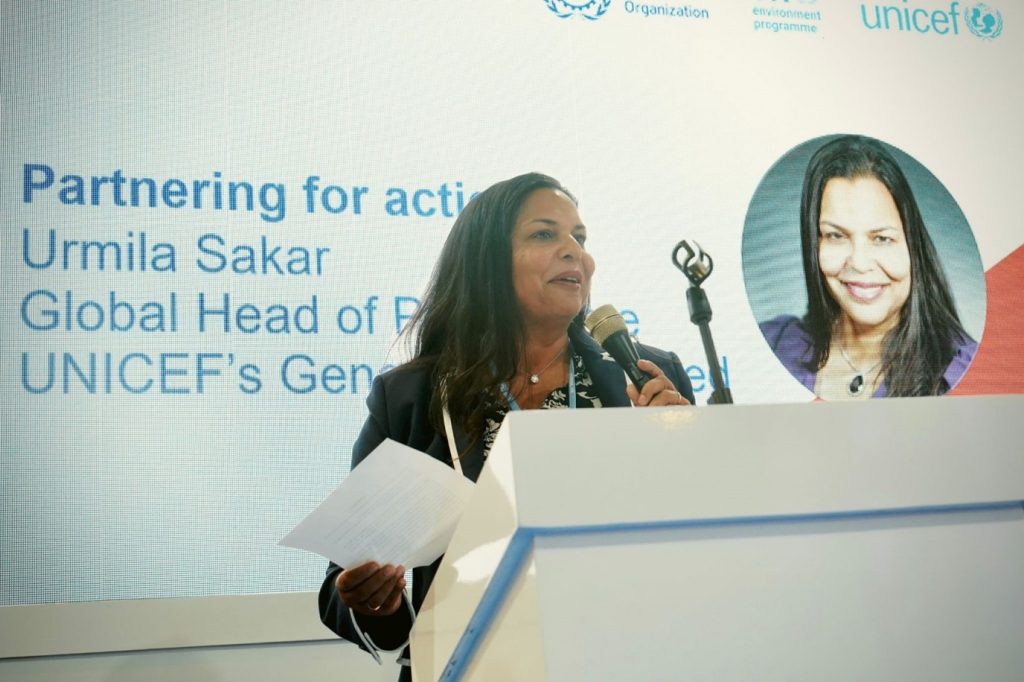
On 9 November 2022, the ILO, UNEP, and UNICEF/Generation Unlimited launched the ambitious “Green Jobs for Youth Pact” at the 2022 United Nations Climate Change Conference (COP27) in Sharm El Sheikh, Egypt. As the legacy of Stockholm+50, the Pact is a bold partnership with the aim to increase commitments and accelerate action towards green job creation for young people as they face an uncertain future driven by the climate crisis

Co-organized by the Pact partners and the European Commission, YOUNGO and LinkedIn, the event was hosted at the first ever Just Transition Pavilion at COP27 and focused on accelerating commitments to secure green jobs and green, employable skills in key countries and high-impact sectors.
Attendees ranged from representatives of member states, employers, workers organisations to young people – an important ingredient of the Pact being the collaboration of stakeholders on different levels and a focus to work WITH and FOR youth.
Moustapha Kamal Gueye, Global Coordinator of the Green Jobs Programme of ILO, opened the meeting by reminding the participants of the interlink between the climate crisis and youth employment. As young people make up the majority of the planet’s population, they dream and aspire towards work in line with their ambitions and values. ILO data shows that investments in the green economy including clean and renewable energy, construction, sustainable agriculture will create 8.4 million jobs for young people by 2030. “A just transition is about leaving no-one behind, this includes the youth,” iterated Mr Gueye. Mr Gueye finished by presenting the ambitious goals of the Pact:
- To create 1 million green jobs,
- To support the greening of 1 million existing jobs,
- To advance 10.000 green entrepreneurs and support the job creation through their growth journey.
The keynote was given by the Director-General for Employment, Social Affairs and Inclusion of European Commission, Joost Korte. DG Korte presented some of the results from a recent Eurobarometer survey on fair and green transitions which indicated that 88% of EU citizens overall support the goal of a green transition that leaves no one behind, and 77% of Europeans feel a personal responsibility to act to limit climate change. Furthermore, two out of three young European believes that being in a job that contributes to the green transition is important to them. However, 45% of young Europeans don’t think that their current skills allow them to contribute to the green transitions. The Green Jobs for Youth Pact aims to address exactly that skills gap. DG Korte underlined that, “Young people indeed are at the forefront in this transformation. Their bravery and energy is decisive. And it is our responsibility to leave a better future to the next generations. In this sense, climate justice is intergenerational justice.” Lastly, the DG invited both governments at all levels, stakeholders and companies to join the Pact.
The keynote was followed by Urmila Sarkar, Global Head of Programmes, Generation Unlimited, UNICEF who emphasized the looming challenge of climate change and youth unemployment into a unprecedented opportunity for ambitious action. Ms Sarkar asked whether policy makers, workers, employers and businesses are equipped for the green transition. Ms Sarkar emphasized that the Pact will equip not only these key stakeholders, but also the youth to take on this challenge through public-private-youth-partnerships. Young people are driving social change and economic growth, and she reiterated that their potential is truly unlimited. The youth advisory board will be the key organ to ensure a meaningful and continuous partnership with the youth.
The subsequent panel was moderated by Mette Grangaard Lund, technical officer, Green Jobs, ILO who has been working closely with UNEP and UNICEF/Generation Unlimited colleagues on the Pact.
Allen Blue, co-founder of LinkedIn and one of the early adopters of the Green Jobs for Youth Pact explained how the LinkedIn data indicate that very soon the demand for green skills will outgrow the supply. Therefore, LinkedIn are happy to join and support the Pact, which aims to not only create new jobs, but also green existing jobs. As a part of their efforts under the Pact, LinkedIn will further develop green skills courses on their Platform. 18.000 employees at LinkedIn will be upskilled in green skills through internal training courses. Lastly, LinkedIn will use their platform and network to bring more of companies onboard for the Pact.
Norine Kennedy, SVP Policy and Global Strategy, United States Council for International Business (USCIB) pointed out how the excitement and thrill of the Pact is truly contagious, as the international network of employers through the international Organization of Employers (IOE) is fully supportive of the practice and inclusive initiative of the Pact. The catalytic effect of working with every sector is key in the Pact, which is a timely initiative to engage with youth and address climate change and youth employment simultaneously.
Boitumelo Molete, Social Development Policy Coordinator, Congress of South African Trade Unions (COSATU) touched upon the importance of engaging with workers and labour unions as young people must get into jobs that are meaningful and decent as a part of the just transition. The reorientation of the economy must engage young people, and they should be protected throughout the change. Ms Moleto gave the example of constitutionalized structures in the South African Union where young people are voted into the structures with a mandate and capacity on labour issues.
Quinn Runkle, Director of Education, Students Organizing for Sustainability – UK (SOS) congratulated the Pact on the inclusion of youth in the Pact, as youth engagement is key not only in the education system itself, as is the case with SOS, or in development cooperation as the Pact. Ms Runkle pointed out that currently the content of the education is not fit for purpose, neither does the way that young learn prepare for the labour market. However, the willingness to learn is immense, in fact, 92% of SOS’s student members believe that sustainability should be incorporated in their curriculum across study and research fields, however. Therefore, the Pact will be working specifically on strengthening environmental education as well as equipping young people with the in-demand skills for green jobs.
Michael Alexander, Communications and Advocacy Expert, UNEP reflected on the injustices and inequalities on career pathways and how the Pact must work to break down such barriers to finding green jobs for youth in the future. Mr Alexander encouraged all interested parties to contact colleagues on the Green Jobs for Youth Pact and to rally behind the initiative.
You can watch the recorded event here.






